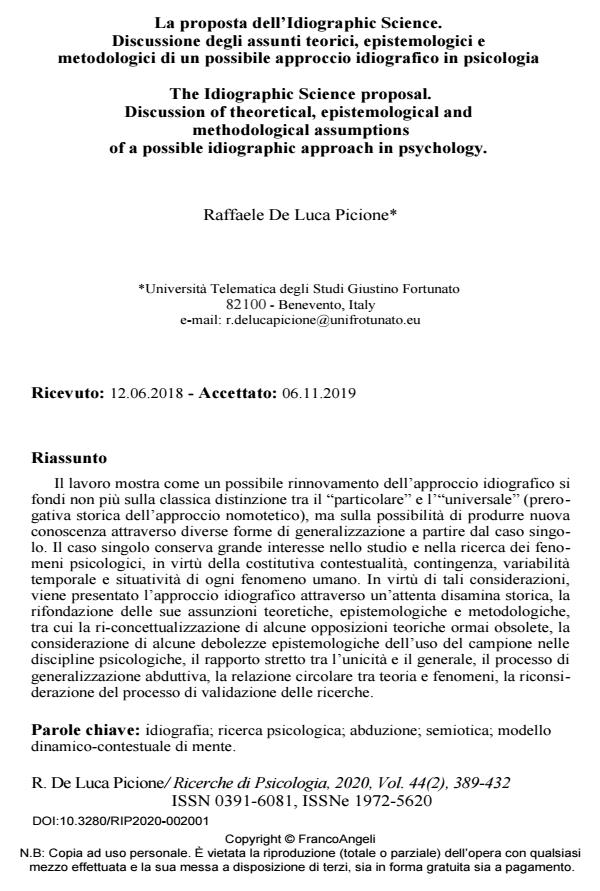La proposta dell’Idiographic Science. Discussione degli assunti teorici, epistemologici e metodologici di un possibile approccio idiografico in psicologia
Titolo Rivista RICERCHE DI PSICOLOGIA
Autori/Curatori Raffaele De Luca Picione
Anno di pubblicazione 2020 Fascicolo 2020/2
Lingua Italiano Numero pagine 44 P. 389-432 Dimensione file 436 KB
DOI 10.3280/RIP2020-002001
Il DOI è il codice a barre della proprietà intellettuale: per saperne di più
clicca qui
Qui sotto puoi vedere in anteprima la prima pagina di questo articolo.
Se questo articolo ti interessa, lo puoi acquistare (e scaricare in formato pdf) seguendo le facili indicazioni per acquistare il download credit. Acquista Download Credits per scaricare questo Articolo in formato PDF

FrancoAngeli è membro della Publishers International Linking Association, Inc (PILA), associazione indipendente e non profit per facilitare (attraverso i servizi tecnologici implementati da CrossRef.org) l’accesso degli studiosi ai contenuti digitali nelle pubblicazioni professionali e scientifiche.
Il lavoro mostra come un possibile rinnovamento dell’approccio idiografico si fondi non più sulla classica distinzione tra il "particolare" e l’"universale" (prerogativa storica dell’approccio nomotetico), ma sulla possibilità di produrre nuova conoscenza attraverso diverse forme di generalizzazione a partire dal caso singolo. Il caso singolo conserva grande interesse nello studio e nella ricerca dei feno-meni psicologici, in virtù della costitutiva contestualità, contingenza, variabilità temporale e situatività di ogni fenomeno umano. In virtù di tali considerazioni, viene presentato l’approccio idiografico attraverso un’attenta disamina storica, la rifondazione delle sue assunzioni teoretiche, epistemologiche e metodologiche, tra cui la ri-concettualizzazione di alcune opposizioni teoriche ormai obsolete, la considerazione di alcune debolezze epistemologiche dell’uso del campione nelle discipline psicologiche, il rapporto stretto tra l’unicità e il generale, il processo di generalizzazione abduttiva, la relazione circolare tra teoria e fenomeni, la riconsiderazione del processo di validazione delle ricerche.
Parole chiave:idiografia; ricerca psicologica; abduzione; semiotica; modello dinamico-contestuale di mente.
- Handbook of Research on Healthcare Standards, Policies, and Reform Maria Francesca Freda, Raffaele De Luca Picione, Maria Luisa Martino, Daniela Lemmo, Ersilia Auriemma, pp.52 (ISBN:9781799888680)
- Psychoanalytic Study on the Xylella fastidiosa Conspiracy Theory Angelo Maria De Fortuna, Cristiano Scandurra, Vincenzo Bochicchio, Raffaele De Luca Picione, in Human Arenas /2025
DOI: 10.1007/s42087-025-00477-y - Looking at oneself in the mirror of the others. Modelisation and implications of a study on human reflexivity starting from semiotics and psychoanalysis Raffaele De Luca Picione, Pablo Fossa, Maria Elisa Molina, Rosapia Lauro Grotto, in RIVISTA DI PSICOLOGIA CLINICA 1/2022 pp.85
DOI: 10.3280/rpc1-2022oa13976 - Sharing Medical Decisions with the Child. An Exploratory Survey in Paediatric Primary Care. Francesca Dicé, Pasquale Dolce, Assunta Maiello, Maria Francesca Freda, in Child Care in Practice /2024 pp.434
DOI: 10.1080/13575279.2021.1910488 - The Semiotic Paradigm in Psychology. A Mature Weltanschauung for the Definition of Semiotic Mind Raffaele De Luca Picione, in Integrative Psychological and Behavioral Science /2020 pp.639
DOI: 10.1007/s12124-020-09555-y - Ten Years of Idiographic Science Raffaele De Luca Picione, Maria Francesca Freda, pp.47 (ISBN:979-8-88730-028-3)
- Changes of narrative meaning-making markers
during the different phases of breast cancer
treatment for women below 50 years old Maria Luisa Martino, Daniela Lemmo, Anna Gargiulo, Daniela Barberio, Valentina Abate, Franca Avino, Maria Francesca Freda, in Health Psychology Report /2021 pp.58
DOI: 10.5114/hpr.2021.105363 - Metapsychology of borders: Structures, operations and semiotic dynamics Raffaele De Luca Picione, in European Journal of Psychotherapy & Counselling /2021 pp.436
DOI: 10.1080/13642537.2021.2000463
Raffaele De Luca Picione, La proposta dell’Idiographic Science. Discussione degli assunti teorici, epistemologici e metodologici di un possibile approccio idiografico in psicologia in "RICERCHE DI PSICOLOGIA " 2/2020, pp 389-432, DOI: 10.3280/RIP2020-002001